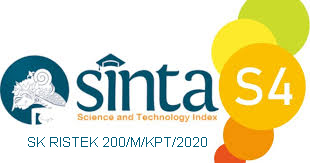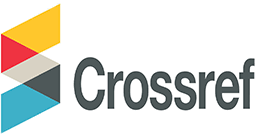Genetic Algorithm Optimization on Nave Bayes for Airline Customer Satisfaction Classification
Abstract
Airline companies need to provide satisfactory service quality so that people do not switch to using other airlines. The way that can be used to determine customer satisfaction is to use data mining techniques. Currently, the website www.kaggle.com has provided Airline Passenger Satisfaction data consisting of 22 attributes, 1 label and 25976 instances which are included in the supervised learning data category. Based on several previous studies, the Naïve Bayes algorithm can provide better classification performance than other classification algorithms. Several studies also state that the use of Naive Bayes can be optimized using Genetic Algorithm (GA) to obtain better performance. The use of Genetic Algorithm for Nave Bayes optimization in classifying Airline Passenger Satisfaction data requires further research to ensure the performance of the given classification. This study aims to compare the use of the Naive Bayes algorithm for the classification of Airline Passenger Satisfaction with and without GA optimization. The data validation process used in this study is to use split validation to divide the dataset into 95% training data and 5% testing data. The test results show that the use of GA on Naive Bayes can improve the classification performance of Airline Passenger Satisfaction data in terms of accuracy and recall with an accuracy value of 85.99% and a recall of 87.91%.
Keywords
Full Text:
PDFReferences
E. L. Widjaja, A. Aprilia dan A. Harianto, “Analisa Pengaruh Kualitas Layanan Terhadap Kepuasan Penumpang Maskapai Penerbangan Batik Air,” Jurnal Hospitality dan Manajemen Jasa, vol. 5, no. 2, pp. 118-132, 2017.
W. Ardhia, “Tingkat Kepuasan Penumpang Terhadap Layanan Maskapai Penerbangan PT. Lion Air Rute Menuju Jakarta,” Jurnal Perhubungan Udara, vol. 41, no. 1, pp. 19-28, 2015.
M. D. Darus dan K. Mahalli, “Analisis Tingkat Kepuasan Penumpang Terhadap Kualitas Pelayanan di Bandar Udara Internasional Kualanamu,” Jurnal Ekonomi dan Keuangan, vol. 3, no. 6, pp. 408-420, 2015.
M. S. Garver, “Using Data Mining for Customer Satisfaction Research,” Marketing Research, vol. 14, no. 1, pp. 8-17, 2002.
V. Gopalakrishnan dan C. Ramaswamy, “Patient Opinion mining to Analyze Drugs Satisfaction Using Supervised Learning,” Journal of Applied Research and Technology, vol. 15, no. 1, pp. 311-319, 2017.
Kaggle, “Kaggle.com,” Mei 2020. [Online]. Available: https://www.kaggle.com/teejmahal20/airline-passenger-satisfaction. [Diakses 24 Maret 2021].
I. A. A. Amra dan A. Y. A. Maghari, “Students Performance Prediction Using KNN and Naïve Bayesian,” dalam 8th International Conference on Information Technology (ICIT), Al-Zaytoonah University of Jordan, Jordan, 2017.
F. Osisanwo, J. Akinsola, O. Awodele, J. O. Hinmikaiye, O. Olakanmi dan J. Akinjobi, “Supervised Machine Learning Algorithms: Classification and Comparison,” International Journal of Computer Trends and Technology (IJCTT), vol. 48, no. 3, pp. 128-138, 2017.
E. N. Azizah, U. Pujianto, E. Nugraha dan Darusalam, “Comparative Performance Between C4.5 and Naive Bayes Classifiers in Predicting Student Academic Performance in A Virtual Learning Environment,” dalam 4th International Conference on Education and Technology (ICET), Malang, Indonesia, 2018.
K. Madasamy dan M. Ramaswami, “Data Imbalance and Classifiers: Impact and Solutions from A Big Data Perspective,” International Journal of Computational Intelligence Research, vol. 13, no. 9, pp. 2267-2281, 2017.
E. M. Hassib, A. I. El-Desouky, E.-S. M. El-Kenawy dan S. M. El-Ghamrawy, “An Imbalanced Big Data Mining Framework for Improving Optimization Algorithms Performance,” Journal & Magazines, vol. 7, no. 1, pp. 170774-170795, 2019.
S. Chen, G. I. Webb, L. Liu dan X. Ma, “A Novel Selective Naïve Bayes Algorithm,” Knowledge-Based Systems, vol. 192, pp. 1-15, 2020.
L. Jiang, L. Zhang, L. Yu dan D. Wang, “Class-Specific Attribute Weighted Naive Bayes,” Pattern Recognition, vol. 88, no. 1, pp. 321-330, 2019.
S. Ernawati, R. Wati, N. Nuris, L. S. Marita dan E. R. Yulia, “Comparison of Naïve Bayes Algorithm with Genetic Algorithm and Particle Swarm Optimization as Feature Selection for Sentiment Analysis Review of Digital Learning Application,” Journal of Physics: Conference Series, vol. 1641, pp. 1-7, 2020.
S. Ernawati, E. R. Yulia, Frieyadie dan Samudi, “Implementation of The Naïve Bayes Algorithm with Feature Selection using Genetic Algorithm for Sentiment Review Analysis of Fashion Online Companies,” dalam The 6th International Conference on Cyber and IT Service Management (CITSM 2018), Medan, Indonesia, 2018.
A. Arwan dan D. S. Rusdianto, “Optimization of Genetic Algorithm Performance Using Naïve Bayes for Basis Path Generation,” Kinetik, vol. 2, no. 4, pp. 273-282, 2017.
E. Stripling, S. v. Broucke, K. Antonio, B. Baesens dan M. Snoecka, “Profit Maximizing Logistic Model for Customer Churn Prediction Using Genetic Algorithms,” Swarm and Evolutionary Computation, vol. 40, no. 1, pp. 116-130, 2018.
D. K. Choubey, S. Paul, S. Kumar dan S. Kumar, “Classification of Pima Indian Diabetes Dataset Using Naive Bayes With Genetic Algorithm As An Attribute Selection,” dalam The International Conference on Communication and Computing Systems (ICCCS), Ranchi, India, 2016.
L. G. P. Suardani, I. M. A. Bhaskara dan M. Sudarma, “Optimization of Feature Selection Using Genetic Algorithm with Naïve Bayes Classification for Home Improvement Recipients,” International Journal of Engineering and Emerging Technology, vol. 3, no. 1, pp. 66-70, 2018.
M. Melanie, An Introduction to Genetic Algorithms, London, England: First MIT Press, 1999.
Y. Religia, A. Nugroho dan W. Hadikristanto, “Analisis Perbandingan Algoritma Optimasi pada Random Forest untuk Klasifikasi Data Bank Marketing,” Jurnal Rekayasa Sistem dan Teknologi Informasi, vol. 5, no. 1, pp. 187-192, 2021.
E. Habibi, M. Salehi, G. Yadegarfar dan A. Taheri, “Optimization of ANFIS Using A Genetic Algorithm for Physical Work Rate Classification,” International Journal of Occupational Safety and Ergonomics, vol. 26, no. 3, pp. 436-443, 2020.
H. Motieghader, A. Najafi, B. Sadeghi dan A. Masoudi-Neja, “A Hybrid Gene Selection Algorithm for Microarray Cancer Classification Using Genetic Algorithm and Learning Automat,” Informatics in Medicine Unlocked, vol. 9, no. 1, pp. 246-254, 2017.
C. A. Ramezan, T. A. Warner dan A. E. Maxwell, “Evaluation of Sampling and Cross-Validation Tuning Strategies for Regional-Scale Machine Learning Classification,” Remote Sensing, vol. 11, no. 2, pp. 2-21, 2019.
M. Stone, “Cross-Validatory Choice and Assessment of Statistical Predictions,” Journal of the Royal Statistical Society, vol. 36, no. 2, pp. 111-147, 1974.
S. Ruuskaa, W. Hämäläinen, S. Kajava, M. Mughal, P. Matilainen dan J. Mononen, “Evaluation of The Confusion Matrix Method in The Validation of An Automated System for Measuring Feeding Behaviour of Cattle,” Behavioural Processes, vol. 148, no. 1, pp. 56-62, 2018.
DOI: https://doi.org/10.31326/jisa.v4i2.925
Refbacks
- There are currently no refbacks.
Copyright (c) 2021 Yoga Religia, Donny Maulana

This work is licensed under a Creative Commons Attribution-ShareAlike 4.0 International License.
JOURNAL IDENTITY
Journal Name: JISA (Jurnal Informatika dan Sains)
e-ISSN: 2614-8404, p-ISSN: 2776-3234
Publisher: Program Studi Teknik Informatika Universitas Trilogi
Publication Schedule: June and December
Language: English
APC: The Journal Charges Fees for Publishing
Indexing: EBSCO , DOAJ, Google Scholar, Arsip Relawan Jurnal Indonesia, Directory of Research Journals Indexing, Index Copernicus International, PKP Index, Science and Technology Index (SINTA, S4) , Garuda Index
OAI address: http://trilogi.ac.id/journal/ks/index.php/JISA/oai
Contact: jisa@trilogi.ac.id
Sponsored by: DOI – Digital Object Identifier Crossref, Universitas Trilogi
In Collaboration With: Indonesian Artificial Intelligent Ecosystem(IAIE), Relawan Jurnal Indonesia, Jurnal Teknologi dan Sistem Komputer (JTSiskom)
JISA (Jurnal Informatika dan Sains) is Published by Program Studi Teknik Informatika, Universitas Trilogi under Creative Commons Attribution-ShareAlike 4.0 International License.


















